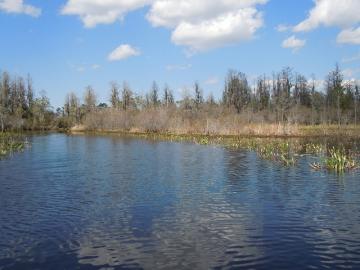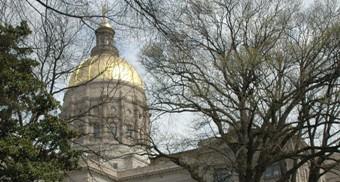
Section Branding
Header Content
Georgia Today: Over one million early voters in Georgia; BioLab fire update; New EV parts manufacturer
Primary Content
On the Friday October 18th edition of Georgia Today: More than one million Georgians have already cast their ballots; Officials in Rockdale County say that all of the chemical product from the BioLabs fire is gone; And another manufacturer of electric vehicle parts is coming to Georgia.

Peter Biello: Welcome to the Georgia Today podcast from GPB News. Today is Friday, October 18th. I'm Peter Biello. On today's episode, more than 1 million Georgians have already cast their ballots. Officials in Rockdale County say that all of the chemical product from the BioLabs fire is gone. And another manufacturer of electric vehicle parts is coming to Georgia. These stories and more are coming up on this edition of Georgia Today.
Story 1:
Peter Biello: More than a million voters have cast their ballots so far in Georgia. The secretary of state's office says the milestone was hit shortly before noon today, the fourth day of early voting in the state. Vice President Kamala Harris is expected at an Atlanta rally tomorrow. And somewhere in Georgia Thursday next week with Barack and Michelle Obama. The National Rifle Association canceled a planned rally with Donald Trump on Tuesday, citing a scheduling conflict. But the former president is expected at a rally in metro Atlanta's Gwinnett County next week, on Wednesday.
Story 2:
Peter Biello: 19 days after a fire at the BioLab plant in metro Atlanta, Rockdale County officials say all of the chemical products at the facility have been removed. They also lifted their shelter in place order. BioLab officials were absent from a news conference announcing the cleanup yesterday, drawing criticism from county Chairman Oz Nesbitt.
Oz Nesbitt: Quite frankly, I think it's a slap in the face. I feel like the citizens and business owners who have been held hostage for the last 19 days deserve to hear directly from the leadership in the corporate management of BioLab.
Peter Biello: Rockdale County schools are set to return to in-person classes on Monday. The fire prompted a switch to virtual learning. State and federal environmental officials are overseeing the remaining cleanup and the investigation into the fire and the company's handling of it.

Story 3:
Peter Biello: A federal agency wants to expand the boundaries of Georgia's vast Okefenokee National Wildlife Refuge. The proposal, announced today could lead to a buyout offer for land intended for a mining project that conservationists have fought for years. Rena Ann Peck of Georgia Rivers calls it a step in the right direction.
Rena Ann Peck: This is a great signal that shows that the U.S. Fish and Wildlife Service aims to protect their Okefenokee Wildlife Refuge. But the threat of mining exists up and down Okefenokee Trail Ridge.
Peter Biello: The proposed boundary expansion includes about 22,000 acres, only a portion of the mineral rich area that conservationists are trying to protect from mining. And it would be subject to negotiations between landowners, the agency and other potential buyers.
Story 4:
Peter Biello: The U.S. Energy Department will loan $670 million to help finance a thermal blanket manufacturing plant in southeast Georgia's Bulloch County. The direct loan to Aspen Aerogels, announced Wednesday, is part of Georgia's growing electric vehicle and battery economy. The company makes thermal blankets or barriers a critical safety component to preventing fires in electric vehicles.
Story 5:
Peter Biello: A climate science nonprofit has launched a new tool to help show what future flooding caused by climate change might look like. GPB's Benjamin Payne reports.
Benjamin Payne: The group Climate Central recently equipped an electric pickup truck with stereoscopic cameras and drove it across the East Coast, including coastal Georgia. The images were then combined with GPS data and projections about future sea level rise and flood levels. The result is a sort of before and after comparison, showing what a certain location could look like after a major flood in 2050 and 2100. Allison Kopicki is with Climate Central and helped develop flood vision. She describes it as Google Street View. But for flooding.
Allison Kopicki: We can know the proximate height of every pixel in an image. And then this allows us to generate precise visualizations of flood scenarios. We think that if you can see into the future, maybe we can change the future.
Benjamin Payne: Human caused climate change is worsening sea level rise and intensifying hurricanes. For GPB News, I'm Benjamin Payne in Savannah.
Story 6:
Peter Biello: South Georgia residents continue reaching out for mental health services three weeks after Hurricane Helene devastated their homes and communities. GPB's Ellen Eldridge has more.
Ellen Eldridge: Survivors of the storm are coping with several emotions, ranging from fear to anxiety and even anger. The Federal Emergency Management Agency, or FEMA, is still connecting people in Valdosta to behavioral health crisis services. Kristin Goin with Valdosta based Legacy Behavioral Health leads the crisis counseling planning team. She says they're there to provide emotional support.
Kristin Goin: So we're at the DRC, the disaster relief center. So if they if one of the female representatives sees that somebody is having a hard time, they will walk them over to us.
Ellen Eldridge: Goin says the crisis teams, stabilize the community and then connect people to local providers for the long term. For GPB News, I'm Ellen Eldridge.
Story 7:
Peter Biello: Four concrete suppliers have been sentenced to prison for participating in a long running price fixing conspiracy in the Savannah area. The Justice Department says over a period of six years, the four colluded to submit bids charging uncompetitive prices for materials essential for construction. Their sentences range from five months to three years in prison. Two companies also were involved in the scheme. One agreed to pay a $20 million fine and the other was ordered to pay a nearly $3 million fine.

Story 8:
Peter Biello: Two north Georgia mines this weekend will hand over gold to be put on the state capital's iconic gold dome. It's part of a nearly $400 million capital renovation project. In a ceremony on Saturday. Capital Police will escort the gold from the Christen and Consolidated gold mines to state officials at the Dahlonega Gold Museum. GPB's Orlando Montoya spoke with Consolidated Gold Mine general manager Dathan Harbert.
Dathan Harbert: So it was a super exciting thing to get involved because Consolidated has such a huge history in mining and the industry here in Dahlonega. Even though we're a tourism operation, we still mined for gold occasionally. And what's special about the gold that we're sending this time is this gold is from some of the original mine tunnels. So we're really excited of being part of that. We're sending ten ounces of real raw Dahlonega gold that was mined by local miners.
Orlando Montoya: Ten ounces doesn't sound like a lot. Can you cover the whole gold dome with ten ounces?
Dathan Harbert: You cannot. So this project, I'm told, is going to require about 90oz. So Consolidated has the opportunity to provide ten ounces for that. And then our counterparts down the road, some of our friends at the Christian Gold mine, they are also providing ten ounces. So as of current 20oz of the required 90 that's needed for the project will be coming from Dahlonega.
Orlando Montoya: And the question that might be on some people's minds is how much is this gold worth?
Dathan Harbert: So as of the time of this recording, our ten ounces that's going to the capital would be worth about $27,000. And again, our counterparts down the road, the Christian miners sending the same. So Dahlonega is sending quite a chunk of change up to the state capital.
Orlando Montoya: And is it in bars or what does it look like?
Dathan Harbert: So the gold that we're sending is a mixture of flake and fine dust. And fine dust is what you find when you're crushing and processing rock. And then the flakes and the small nuggets are the kind of thing that you would find in the rivers and streams. So what we're sending doesn't look all that impressive. But when it's processed and hammered into very thin sheets, it's going to be a massive amount. So one ounce of gold can be hammered out to cover almost the entire football field.
Orlando Montoya: And how does it actually get on the dome?
Dathan Harbert: Well, that's a that's a question above my pay grade for sure. But the the electroplating and gilding process is definitely an art form. They have done this three times to the state capital. This will be the third time. So they did it once in the 50s and again in the early 80s, and Dahlonega was part of that at the time as well.
Orlando Montoya: And some of that history is quite interesting for a lot of people. Some people might not know it, but I think the first U.S. Mint in the South was there, wasn't it?
Dathan Harbert: That is correct, Absolutely. So Dahlonega was home of the first major U.S. gold rush, so we were the first major rush in 1829. And we went from a community of a few hundred people to over 15,000 people in just a matter of a few weeks. So Dahlonega really experienced that first gold rush. so I often tell people that we were the 20 Niners as opposed to the famous 40 Niners that went out west. And a lot of those miners that went west were from Dahlonega taking the techniques that they learned here out west to try to strike it rich.
Orlando Montoya: So what does it mean to you when you look at the gold dome?
Dathan Harbert: Well, I've always known that the gold that's on the dome came from Dahlonega. So being able to tell people, you know. Yeah, Dahlonega is the one that sent that gold. It really just kind of hits home to say that we've had a piece of something that important. But now to be on this end of it, being able to be the one that's going to be on stage presenting the gold to the state of Georgia and sending it down there, it really is just it's undescribable to be a part of something so momentous really to be able to drive through downtown Atlanta and see the big dome and to say, you know, I was a part of that opportunity to put the gold on the dome. It really is an undescribable feeling. And I'm so proud that Dahlonega will be able to continue to say that we're the home of the gold on the Capitol dome.
Orlando Montoya: All right. So that's Dathan Harbert of Consolidated Gold Mine in Dahlonega, Georgia. Thanks for joining me today.
Dathan Harbert: Thank you so much. I really appreciate you calling.

Story 9:
Peter Biello: In sports, top ranked Texas and number five Georgia meet for the first time as SEC members tomorrow. Both are looking to boost their conference standing as the initial rankings for the 12 team college football playoffs draw near next month. The Bulldogs have three league wins but are a half game back in the loss column. Texas has won six straight, including last week's blowout of rival Oklahoma in the Red River shootout. Kick off is tomorrow at 7:30 Eastern. And in soccer, Atlanta United concludes the regular season against Orlando tomorrow for Atlanta United to have any hope of qualifying for the Audi 2024 MLS Cup playoffs. United must win tomorrow and a few other teams must prevail. The match kicks off tomorrow at 6 p.m..
And that's it for this edition of Georgia Today. Thanks so much for tuning in. If you want to learn more about any of these stories or check out the latest headlines, go to GPB.org/news. And remember to subscribe to this podcast. We're going to be back in your feed on Monday afternoon with all the latest news from Georgia, and you won't want to miss any of it. If you've got feedback, send it our way by email. The address is GeorgiaToday@GPB.org. I'm Peter Biello. Thanks again for listening. Have a great weekend.
---
For more on these stories and more, go to GPB.org/news



